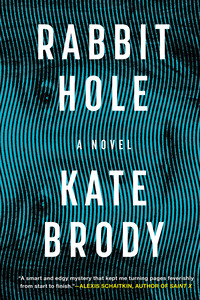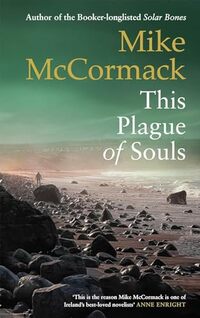The Tzer Island book blog features book reviews written by TChris, the blog's founder. I hope the blog will help readers discover good books and avoid bad books. I am a reader, not a book publicist. This blog does not exist to promote particular books, authors, or publishers. I therefore do not participate in "virtual book tours" or conduct author interviews. You will find no contests or giveaways here.
The blog's nonexclusive focus is on literary/mainstream fiction, thriller/crime/spy novels, and science fiction. While the reviews cover books old and new, in and out of print, the blog does try to direct attention to books that have been recently published. Reviews of new (or newly reprinted) books generally appear every Monday, Wednesday, and Friday. Reviews of older books appear on occasional weekends. Readers are invited and encouraged to comment. See About Tzer Island for more information about this blog, its categorization of reviews, and its rating system.
Rabbit Hole by Kate Brody
 Friday, December 29, 2023 at 7:07AM
Friday, December 29, 2023 at 7:07AM 
Published by Soho Crime on January 2, 2024
The value of Rabbit Hole derives from its focus on the public’s obsessive interest in true crime (or possible crime), particularly when a pretty white girl goes missing. Speculative theories are presented as absolute fact by people who substitute their invented realities for objective truth.
Angie Angstrom disappeared shortly before she was to start classes at a community college. Angie’s half-sister, Theodora (Teddy) Angstrom, is two years younger than Angie. Teddy and Angie have the same mother, Clare Angstrom. Teddy's father is Mark Angstrom. Angie's father was Mark's brother. Clare married Mark after his brother died.
Angie attended a party on the evening of her disappearance. She told people she was getting a ride from her boyfriend. Whether Angie actually had a boyfriend and the possible boyfriend’s identity are part of the mystery. Teddy saw Angie when she briefly returned home after the party. Teddy is the last person known to have seen Angie, although she was slow to admit that fact to her parents and the police.
A subreddit is devoted to Angie’s disappearance, giving fools the opportunity to assign blame. That seems to be a favorite American pastime. Many people who comment on internet forums think Mark is creepy because he married his brother’s widow. Since they regard him as creepy, they assume he killed Angie or did something that drove her into hiding. Why anyone would think Mark’s choice of marital partners is a reason to judge him, much less evidence of murder, is a mystery equal to Angie’s disappearance.
As Rabbit Hole begins, Mark has just committed suicide by driving off a bridge on the tenth anniversary of Angie’s disappearance. He had a substance abuse problem that predated Angie’s fate.
Teddy’s father was conducting his own investigation into Angie’s disappearance. As Teddy goes through his papers, she finds some notes that apparently relate to investigative leads. One is the phone number of a landscaper who Angie thought was hot (so did Teddy, although she wouldn’t admit it to Angie). A text on Mark’s phone leads Teddy to her brother’s ex-wife. Blurry photographs might or might not prove that Angie is still alive. Examining Angie’s old social media accounts (who knew that MySpace still exists?) provides more clues but no definitive answers.
Mark was in touch with Mickey Greeley, a woman who, as an apparent hobby, investigated Angie’s disappearance. Whether Mickey resembles Angie at the age of her disappearance seems to be a matter of opinion. Maybe Mark hung out with Mickey because of that resemblance. Maybe Mark was sleeping with Mickey. Angie can’t be sure, although Angie and Mickey become attached in a clingy way that might have been similar to Mickey’s relationship with Mark.
The story is told in the third person from Teddy’s perspective. Teddy is a high school teacher. She has an empty apartment but she spends most of her time with her mother, with whom she has a strained relationship. Teddy has no boyfriend. A shrink told her that Angie’s disappearance has made her fear happy endings. She has taken herself off the dating apps again, although she knows she will return when she wants sex or a good restaurant meal.
Kate Brody does an impressive job of planting real and misleading clues to keep multiple mysteries in play throughout the novel. What happened to Angie? Which supporting characters are disguising their true stories? Did any of them play a role in Angie’s disappearance and, if so, why are they making themselves part of Teddy’s life?
Teddy is such a mess that she’s almost a sympathetic character, if only because she loves and is caring for Angie’s old and dying dog. She’s also maddening in ways that make it difficult to sustain sympathy. Teddy makes bad decisions. When she’s doxxed on Reddit, she buys a gun, starts carrying it with her, forgets she has it and brings it to school. The choices she makes about sex partners range from questionable to awful and become more dangerous (at least psychologically) as the novel nears its end.
I give high marks to the subreddit transcripts, which perfectly capture the idiocy of Reddit discussions. I also appreciated Teddy’s questions about her father when she begins to suspect he might have been a bad guy. Should she stop loving and missing him if her suspicions prove to be true? Does the part of him she loved just disappear if she learns that another part of him was creepy?
A good many readers are uncomfortable with ambiguous endings. They want all their questions answered. But like many “true crimes” that are discussed on blogs, internet forums, and bad television shows, the truth isn’t always knowable. The information Teddy acquires points to a plausible explanation of Angie’s disappearance, but definitive answers are elusive. The novel’s purpose is not to solve the mystery but to explore the impact of “true crime” speculation upon a family that has no answers. In some respects, that makes Rabbit Hole a more interesting novel than it might have been if the mystery had been neatly resolved, although I recognize that readers who demand certainty will be frustrated with the way the story ends.
RECOMMENDED
This Plague of Souls by Mike McCormack
 Wednesday, December 27, 2023 at 5:12AM
Wednesday, December 27, 2023 at 5:12AM 
First published in Great Britain in 2023; published by Soho Press on January 2, 2024
John Nealon grew up with an understanding that farming “was a glutinous realm, throbbing with pain across cycles of death and renewal that were tinted with green shit and blood-veined mucus.” When his father died, Nealon sold the cattle and rented out the farmland, keeping the house as his residence when he’s not traveling. Nealon studied art, demonstrated serious potential, and squandered his talent by devoting his days to alcohol and weed.
In the east of Ireland, Nealon met Olewyn. He either rescued or kidnapped her as she was riding a heroin high. He brought her back to his village in the west of Ireland. They married and Olweyn became pregnant. Nealon built a studio, furnished it with paints and canvasses, then watched his dreams die. “In the neatness and order of his new studio, Nealon recognized not a new beginning but an end, a memorial to everything he had already done and a lament to all those things his imagination now refused to reach for.” He spent the following years working as a carpenter.
Then Nealon was arrested and remanded to prison to await trial. After a ten-month detention in prison, Nealon’s trial was “set at naught by bad grammar and poor spelling.” The prosecution’s case collapsed and Nealon returned home to find an empty house. Nealon’s backstory is revealed in “separate strands and lurching incidents” as Nealon contemplates his life and lonely home.
As the novel begins, Nealon has no idea where his wife and child have gone. Instead of being greeted by his family, he is greeted by his ringing phone. A series of conversations with a stranger follow. The stranger seems to know everything about Nealon, including the precise moment Nealon enters his home and the location of his electrical main. The stranger wants to meet. The stranger hints that he knows the location of Nealon’s wife and child, so Nealon agrees to meet him.
Nealon conducts a paranoid search of his body and clothing for a transmitter, without result. How does the stranger seem to know his every move? An undefined threat, perhaps related to terrorism, has Ireland on high alert. Soldiers patrol the streets and set up checkpoints on local roads. Is the stranger related to the national threat? Nealon worries about his wife and son in this frightening historical moment. But perhaps it is not the moment that frightens them. Perhaps Nealon is the threat. Nealon comes to understand that they “should not be within psychic distance of him for fear the black radiance of his accumulated circumstances may shrivel and waste them.”
The story comes together during Nealon’s meeting with the stranger. Small observational details that seemed unimportant to the narrative suddenly gain new meaning. It takes some time to learn what Nealon might or might not have done that prompts the meeting. Nealon is accused of extraordinary crimes, improbably committed for altruistic purposes. Could the accusations be true? Is the terrorist threat a real thing? Mike McCormack leaves the reader with the stranger’s opinions but no clear answers.
At the meeting’s conclusion, Nealon has an epiphany. McCormack does not spell out Nealon’s conclusions or the reasoning that brings Nealon to a new understanding of his life. The stranger gives Nealon a choice, but the choice and its consequences are just as unclear as the stranger’s identity. Perhaps the choice involves a return to, or renunciation of, the past. Readers who like to discuss ambiguous literature will find enough material in This Plague of Souls to fuel a lengthy debate.
Despite (or because of) its puzzling and frustrating plot, This Plague of Souls is a joy to read, if only for the sharpness of McCormack’s prose and the depth of Nealon’s isolated existence. Perhaps a second reading would help my comprehension of the novel’s ending and the point that McCormack wanted to make. I will leave it to more scholarly minds to undertake that analysis. I’m happy to have experienced the story and its telling.
RECOMMENDED
Winter's Gifts by Ben Aaronovitch
 Friday, December 22, 2023 at 5:09AM
Friday, December 22, 2023 at 5:09AM 
First published in the UK in 2023; published in a deluxe edition by Subterranean Press on December 1, 2023
Winter’s Gifts is a good book for readers who miss the X Files. The supernatural/horror elements in this short novel (or long novella) are . . . wait for it . . . snow zombies. Don’t let that discourage you from reading the book. Being made largely of snow and trash, they bear little resemblance to ordinary zombies.
The novel is the most recent in Ben Aaronovitch’s Rivers of London urban fantasy series. Winter’s Gifts features Kimberly Reynolds, who appeared in a couple of earlier novels in the series. Reynolds is an FBI agent who, like Mulder and Scully, handles cases for the FBI that have “unusual characteristics.”
A retired agent named Patrick Henderson contacted the Bureau and asked for a meeting in Eloise, Wisconsin to discuss such a case. Eloise is way up north, not far from the Apostle Islands. Reynolds must contend with a blizzard as she makes her way to the small town. She arrives just after a snow tornado destroys the town hall.
A neighbor tells Reynolds that she saw Henderson being dragged from his house by a shambling creature with antlers. The neighbor assumed she was dreaming and went back to bed. When Reynolds finds a mutilated deer, she wonders if Henderson was abducted by someone carrying a deer head. Her subsequent discovery of a human arm suggests that there is more to the case than animal mutilation.
Reynolds wonders whether the mystery that troubled Henderson ties into the Marsh expedition. Its explorers made camp in Eloise in 1843 before they disappeared. Reynolds finds the journal of a Canadian trapper in the local library that provides clues to the fate of the explorers. Reynolds suspects that wolf spirits may have been involved. Scott Walker, an ethnographer from the Bureau of Indian Affairs, helps Reynolds understand local legends and native history relating to supernatural creatures, leading Reynolds to suspect that a weaponized spirit may be preying on the community.
The other significant characters are the local librarian (Sadie Clarkson), a meteorologist (William Boyd), a little girl named Ashley, a grandmother named Ada Cole who owns the local hotel, and a missing hotel guest named Bunker. Some of the characters are magicians/wizards/witches. Some characters who aren’t practitioners of magic are knowledgeable about the supernatural. Bunker seems to have been compiling information about Henderson, Walker, and Clarkson for a mysterious purpose. Reynolds needs to decide whether she can trust characters who dabble in magic.
A couple of Native Americans join the cast in the novel’s second half. One of them is probably a supernatural being, although he’s not a snow zombie.
The explanation of the snow zombies involves desecration of the environment. The spirits are bothered by people who litter. Well, who isn’t? By definition, supernatural story elements don’t need to be rational, so the novel’s sketchy explanation of snow monsters is probably as good as any.
Aaronovitch keeps the story moving, adding elements of mild horror to an investigation of unusual circumstances before hastening the pace with chases through the snow and across the ice. While the story isn’t particularly frightening, the characters are entertaining. Reynolds develops a romantic attachment that might be more accurately described as a lustful attachment, although the G-rated narrative suggests that Reynolds hasn’t cast aside her religious upbringing to embrace the joys of hedonism.
While I’m not generally a fan of urban fantasy, I’ve found Aaronovitch to be one of its better practitioners. Readers who are fond of urban fantasy should be pleased with this latest entry in the Rivers of London series.
RECOMMENDED

